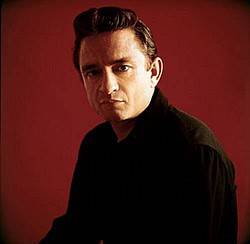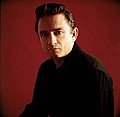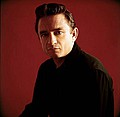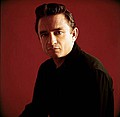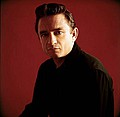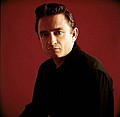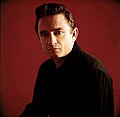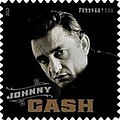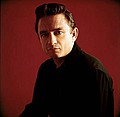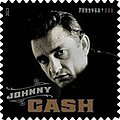Johnny Cash would be 80. For his 80th this is what we get.
Throughout his career, Johnny Cash recorded spiritual songs which he sometimes intermixed on his albums and sometimes released as a single unit.
On April 3, Columbia/Legacy will release Bootleg IV: The Soul of Truth, a collection of gospel and spiritual recordings by the legend, both released and previously unreleased.
The tracks are traditional hymns and folk songs, as well as original compositions by Cash and many other songwriters. These recordings date from a period when his life was finally on an even keel, evidenced by "His excitement for his faith," as the liner notes written by his son, John Carter Cash, bear witness.
The bountiful album catalog of Johnny Cash on Columbia Records, for whom he recorded from 1958 to '83, is blessed with many albums of faith, from 1959′s classic Hymns By Johnny Cash and 1962′s Hymns From the Heart, to his much-lauded concept album projects of 1968 (The Holy Land) and 1973 (The Gospel Road), and more. The chronology moves ahead a few years for Bootleg Volume 4, which features tracks that were cut both at Columbia Studios in Nashville, as well as his own House Of Cash in Hendersonville, Tennessee.
The recordings were made during his Columbia tenure, though not necessarily released on Columbia at the time. For example, as compilation producer Gregg Geller explains, "The centerpiece of Bootleg Volume 4 is the first 20 songs on Disc One, which comprised the album A Believer Sings The Truth, originally recorded for the small Cachet Records label in 1979, half of which were reissued in 1982 on CBS's boutique gospel label, Priority Records – neither the original nor the reissue were widely distributed. Of the remaining five 1979 recordings on Disc One, four appeared briefly on the album I Believe…, released by Arrival Records in 1984; the fifth is the aforementioned Truth."
The latter is a reference (Geller explains) to a previously unreleased song based on a poem that was believed to have been written by Muhammad Ali and presented to Cash, who recorded but never released the track. The poem turned out to be written by the Sufi leader Hazrat Inayat Khan, and one of its lines gives this collection its title: "The soul of truth is God."
The seemingly convoluted release history of the tracks on Bootleg Volume 4 is part of the allure of the series to Cash-philes around the world. Disc two begins with 12 tracks recorded in 1975, intended for an LP that never received a title and was never released. (Although two of its tracks have shown up on compilations issued over the past five years.) Disc two then proceeds to 10 tracks that comprised a rare LP prized by Cash collectors, Johnny Cash—Gospel Singer, recorded in 1983 for the CBS gospel label, Priority Records. The final four tracks are previously unreleased outtakes from those same sessions.
Once the track genealogy is sorted out, the music is revealed for what it is – the gospel and spiritual foundation of Johnny Cash's life. As John Carter's evocative 1,500-word liner notes essay points out, gospel music was an integral part of his father's life from earliest childhood. Whether the family was out working the fields of their Dyess, Arkansas farm, or listening to the Sears-Roebuck Silvertone radio late on a Friday or Saturday night, or singing together on Sunday morning at the Dyess Central Baptist Church, gospel music was the be-all and end-all.
"The music set a foundation for J. R. Cash," John Carter writes, "and upon it he established the motivation for his existence. With the songs of the gospel came faith, and along with faith, a fortitude and persistence that would not be denied. If you were convinced of my Dad's honesty, it is because he was confident of his purpose, and that purpose was defined by gospel music. Though he would sing many kinds of music in his life, he was never truer than when he sang songs of faith."
Through the highs and lows of his career on records, both at Sun and Columbia, Johnny Cash kept his gospel roots up front in the spotlight. Friends and family would join in the testimony, demonstrated throughout Bootleg Volume 4, as he is joined by June Carter Cash (He's Alive), Sister Rosetta Tharpe (This Train Is Bound For Glory, Far Side Banks Of Jordan), Rosanne Cash (When He Comes), Cindy Cash (Lay Me Down In Dixie), Anita Carter (Over The Next Hill (We'll Be Home)), Helen Carter (on the Carter Family's Way Worn Traveler), Rodney Crowell (You'll Get Yours And I'll Get Mine, the Gaither Family's He Touched Me), Jessi Colter (The Old Rugged Cross), and many others on this collection.
Songwriters including Billy Joe Shaver (I'm Just An Old Chunk Of Coal), Sister Rosetta Tharpe (Strange Things Happening Every Day), Bill Monroe (You're Drifting Away), Dorothy Love Coates (That's Enough), Marijohn Wilkin (Back In The Fold), Mark Germino (God Ain't No Stained Glass Window), and Rodney Crowell (Wildwood In The Pines) share the stage with Cash, whose compositions account for 19 of the 51 tracks.
"At the very heart of this faith was gospel music," John Carter's notes conclude. "I invite you to join me, and get to know the man John R. Cash as I remember him. You will hear him in these treasured recordings. Listen carefully: Spirit, Faith, Gospel. The very source of his vision."
Johnny Cash news
